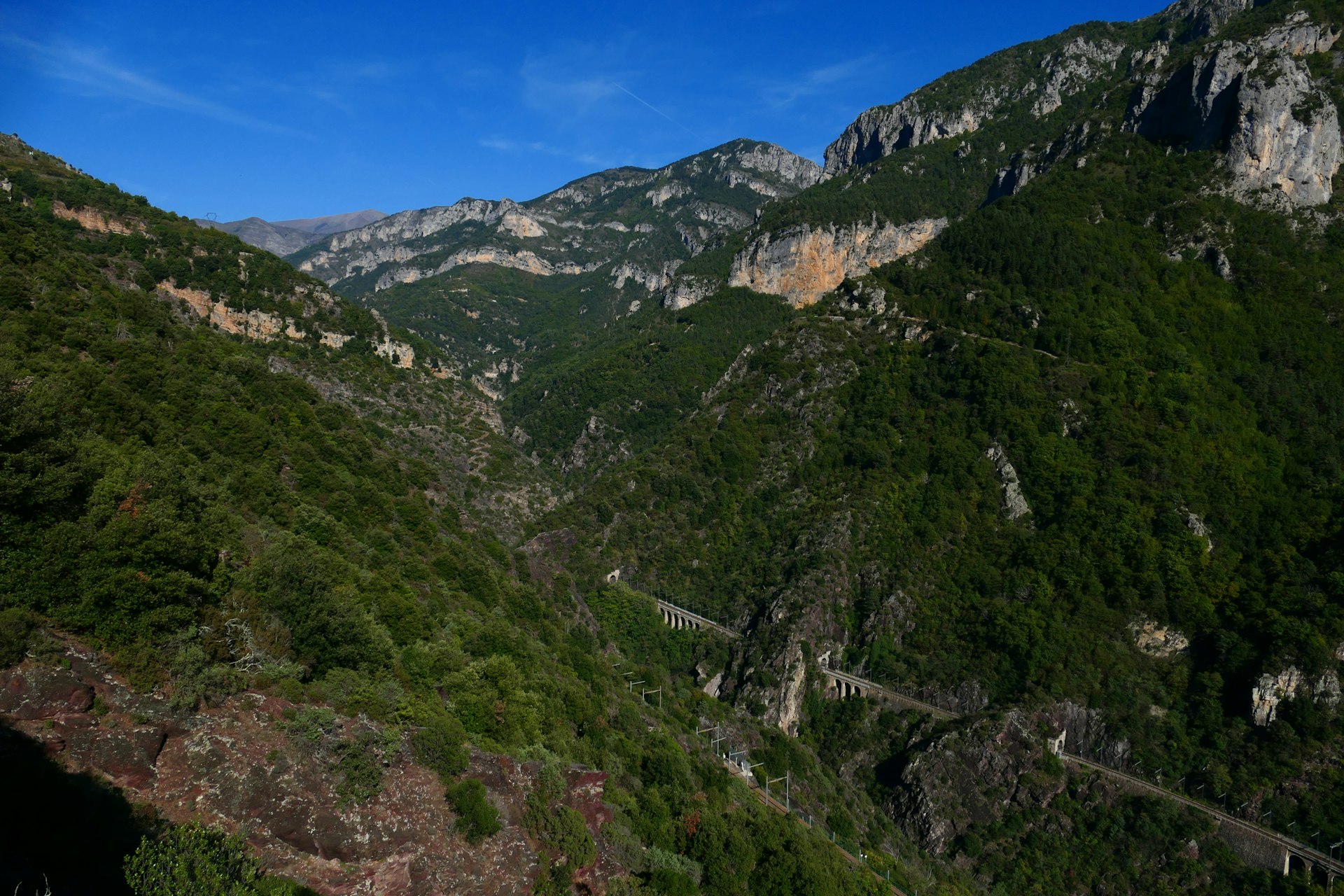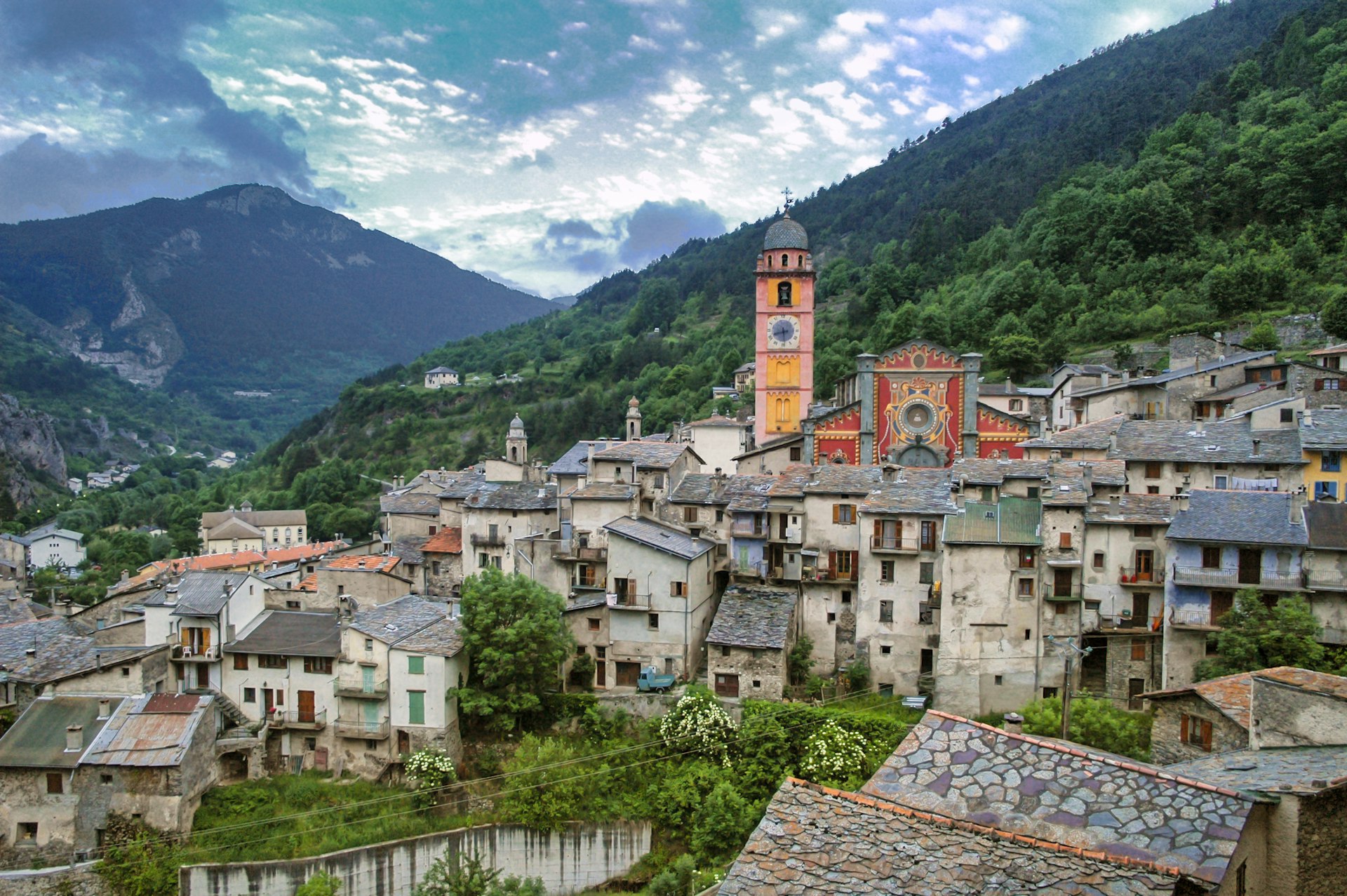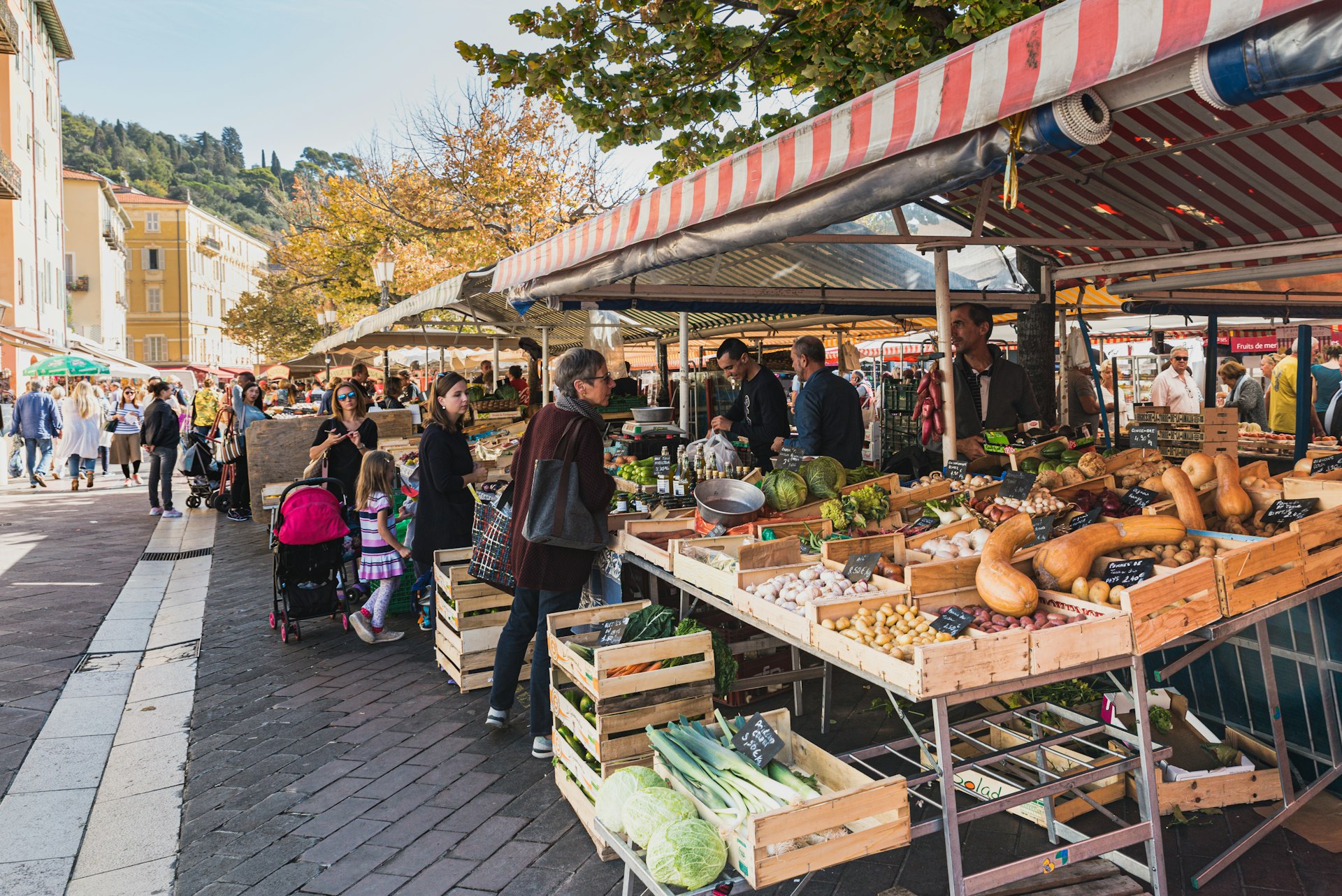Despite the Côte d’Azur’s postcard image of beaches and palm trees, much of the Alpes-Maritimes – the French département (province) which lies in the Côte d’Azur’s embrace – is covered by alpine terrain.
From Nice, it’s easy to explore the region’s little-known alpine hinterland on windy rural roads with twisty hairpin bends and impatient local drivers, but for a more relaxing mode of travel take a gentle two-hour train journey that crosses pine-scented plains and deep gorges as it connects the city with Tende, a small border village deep in the mountains that feels as Italian as French.
Named for the Vallée des Merveilles (The Valley of Wonders) – a striking, serene landscape of over 40,000 mysterious Bronze Age stone carvings all accessible on day-long hiking routes near St-Dalmas-de-Tende (one of the last stations along the line) – the Train des Merveilles is an engineering feat of tunnels, viaducts and spiral loops.
The railway is also an important lifeline connecting mountain villages with the coast. In the past, shepherds would transport their sheep herds from their grassy summer pastures to winter homes on the line. More recently, it brought critical supplies and first responders when Storm Alex cut off road access (and caused loss of life) as it swept through the region in 2020.
Departing from Nice on the Train des Merveilles
There are at least two Train des Merveilles departures from Nice a day (more in the summer months). However, between June and September (and weekends in April and October) there is a daily timetabled service departing at 9.15am with an expert guide onboard for visitors. On this train journey you get live commentary about the railway line and the region – in both French and English – a fascinating accompaniment to the journey at no extra charge. The 9.15am departure is also perfect for a pre-lunch arrival into Tende at 11.15am.
I found the instructions on the SNCF Connect website when I booked my ticket a little vague (“look out for the guide on the platform”), so I arrived 20 minutes early. I couldn’t find anyone on the platform, but the train itself is fairly small and once on board I heard an announcement over the loudspeaker about what carriage the guide would be in, so I made my way there and found a free seat.
From the outside, the Train des Merveilles is styled like a typical regional commuter train in Provence, but there are subtle differences. There are fewer carriages, to start, and there’s a variety of seating configurations including curved lounges, seem designed to capture the route from all angles, as well as plenty of standing areas with oversized windows to admire the view.
The palm trees and belle epoque facades of Nice disappear almost as soon as the train pulls out of the station and veers away from the coast . After passing through the city’s more industrial northeastern neighbourhoods, we’re submerged in the seasonal colours of yellow broom in bloom and lipstick-red poppies. The train made obligatory stops at a clutch of sleepy stations with station houses in faded pastel shades, although no one got on or off at most.

What to expect on the Train des Merveilles journey
People started to move around the carriage fairly early on to admire the increasingly alpine scenery from all angles, and we all crowded to the left side of the carriage on the approach to Peillon, a perched village concealed between Aleppo pine-clad mountain folds. Fortunately, the train driver is well-versed in the highlights of the route and slowed down as we passed below it, allowing us all a generous view.
Marie-Stéphanie, our guide, explained the track’s history: inaugurated in 1928, originally to transport merchandise between Nice and the Italian city of Turin, Tende is today the end of the line (although you can connect into Italy on Trenitalia trains once there).
The aim was for the track to run in a straight line and to cross the deep gorges that cut through the jagged landscape, so towering viaducts needed to be constructed. Just half an hour out of Nice, we glimpse our first cascade rushing out of red shale from a viaduct 40 metres high.
A pattern quickly appears of tunnels through mountains and viaducts across valleys, punctuated by forests of pines and larch trees and the occasional waterfall. Before pulling into Sospel, a pretty Italianate town high up above the border town of Menton, we passed through a tunnel nearly 6 kms (3.7 miles) in length – the second longest in France.
From there, we push into the Roya Valley, which toggles between France and Italy (although the train route remains resolutely in French territory). The final stretch of the journey, Marie-Stéphanie informed us, is when the ascent accelerates climbing from 300m to 800m in altitude.
This is made possible by a couple of railway spirals carved out of the mountain, an engineering marvel we don’t see or feel but become aware of when we emerge from tunnels high above the track we were minutes ago on.
A 15-minute stop in Breil-sur-Roya was enough time for most people to stretch their legs on the platform and buy a coffee, although it’s also the place to disembark for the Ecomusée du Train des Merveilles, a sprawling transport museum at the station. Nearly everyone crowds back on as the stationmaster signals departure. It would seem we’re all in it together for the final destination of Tende.

Arriving in Tende
The stops from (and including) Breil-sur-Roya are of most interest to travellers and arrive in quick succession: Fontan-Soarge, where you can pick up a bus for the perched village of Saorge and its serene monastery; St-Dalmas-de-Tende, the jumping-off point for the Vallée des Merveilles hiking trails; and La Brigue, a tiny village with an enormous treasure in the form of Sanctuaire Notre Dames des Fontaines (a 15th-century church 4km out of town considered the Sistine Chapel of the Southern Alps for its intricate frescos).
Tende itself appears as a colourful scattering of townhouses terraced into the hillside, all topped with the village’s signature grey slate tiles. As the doors opened in Tende, we spilled out onto the platform.
Most of us headed in the same direction, towards the pedestrianised old town with its atmospheric covered alleys known as carigiu, although I noticed plenty of backpacks and hiking poles too.
Conveniently, the tourist information office is just across from the station; next door to it is the Musée des Merveilles, where visual displays and artefacts trace the history of the prehistoric carvings of the Vallée des Merveilles. Don’t miss it in the rush to make the train for the return journey.
Speaking of which, the train back to Nice in summer is at 14.44 and that’s enough time to add on to a visit to the ornate Collégiale Notre-Dame de l’Assomption collegiate church with its frescoed Baroque facade and to sit down and savour a mountain lunch.
How to make it happen
A same-day return ticket from Nice to Tende on the Train des Merveilles costs €31.60. I booked my ticket a few days in advance, although, as with any commuter train, you can also buy your tickets the day of your travel at the train station.
Unlike France’s high-speed TGV’s or intercity trains, there is no food and drink service onboard, but you can bring your own food, or buy a coffee and croissant from one of the kiosks at the train station. You can also pick up snacks during the long pause in Breil-sur-Roya.
There’s no wifi on board but I was able to connect to the free wifi at Nice station. There’s plenty of space for suitcases or rucksacks, and you can also bring bikes onboard.
If you’re day-tripping to Tende and planning to dine out for lunch, definitely phone ahead or pop in to book a table as soon as you arrive. Also, outside of the busy tourist areas, restaurants on the Riviera open for very defined hours, normally noon to 2.30pm for lunch.
Here is more expert advice to help you plan your trip to France:
Do you need a visa? Read on to learn more here.
Trains, planes and bikes: our best tips for getting around
Save this guide to the key things to know before you go.
Link your trip with these other great destinations to see in France.
